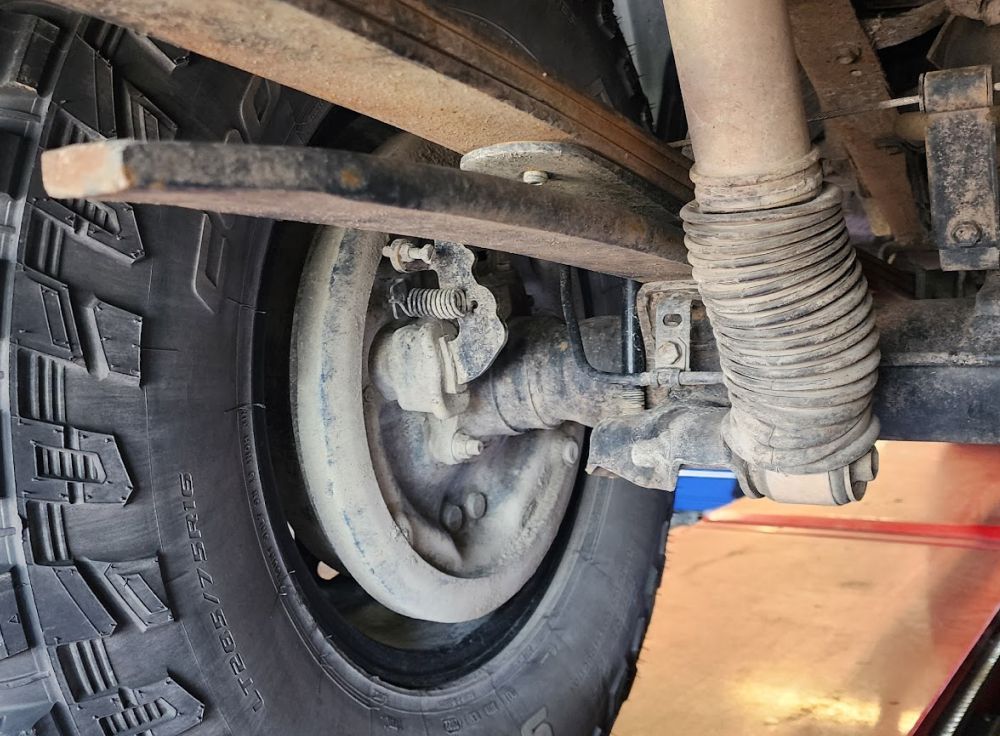Our Blog
Discover expert auto diagnostics at 17th Street Automotive in Virginia Beach. Trust our skilled technicians for reliable service. Visit us today!

When you bring your vehicle to 17th Street Automotive , you’re not just choosing an auto repair shop.... You’re choosing a local, community-centered small business that invests in people, technology, and the future of transportation. We understand that repair costs are an important part of your decision, and we want to share openly why our pricing sometimes differs from chain stores or big-box competitors and why that difference benefits YOU and your community. ⭐ Modern Cars Demand Modern Expertise Today’s vehicles are rolling computers. They contain: Hybrid and plug-in hybrid systems Full EV platforms High-voltage lithium batteries Artificial Intelligence ADAS calibrations (lane assist, blind spot, adaptive cruise, 360° cameras, radar, infrared sensors) Advanced HVAC systems with THREE phase AC compressors Brand specific technologies from American, European, Korean, Japanese, Chinese, and Australian manufacturers To safely and properly repair these systems, our team must constantly evolve. This means: Ongoing inperson and online training thru NAPA, Autozone, WorldPac, ATI, ATG, and many more! Certifications and mentorship programs (ASE, ATI, NAPA, TechNet, PROvantage, BDG Hampton Roads) Specialized tools and OEM level diagnostic equipment Annual software updates We do this so every YEAR, every MAKE, and every MODEL/SUB MODEL that drives into our bays is serviced with OEM level accuracy, right here in Virginia Beach. ⭐ Investing in Quality Means Investing in YOU Because we’re local, every improvement we make benefits our neighbors directly. We invest in: A fully equipped 10-bay repair center Premium parts with stronger warranties Advanced scan tools and EV/ADAS-capable equipment Higher insurance and liability coverage for your protection A free loaner vehicle fleet for our VIP customers Lifetime warranties and 3-year/36,000-mile NAPA nationwide coverage You’re not paying for “extra”—you’re paying for trust, safety, precision, and peace of mind. ⭐ Your Support Fuels Community Impact One of the most meaningful reasons to support a local small business is knowing that your dollars stay right here at home. When you choose 17th Street Automotive, you support: Local Heroes, our Military Personnel & First Responders Guns ’N Hoses hockey tournament Firefighter & first responder appreciation day Police donation car wash for fallen officers Donations to Virginia Beach Rescue Squad & VB Fire Foundation Dedicated first responder mural building Annual 9/11 memorial events Local Students & Education Mentorship programs with Virginia Beach high schools Partnerships with Virginia Beach City Public Schools (Model Partner accreditation) Collaboration with DARS rehabilitation programs Support for TRS Kids, Maverick Learning Center & Jonathan Cares Local Events & Culture Midnight car shows New Year’s celebrations Garage art shows with local artists Cornhole tournaments, giveaways & community block events Local Innovation We’re proud to collaborate with NAPA Gold, AutoZone PROvantage, Advance TechNet, and ATI coaching programs to keep Hampton Roads on the cutting edge of automotive service. When you choose us, you’re helping us fuel community programs that big-box chains simply don’t invest in. ⭐ Recognized Excellence You Can Trust We’ve proudly earned recognition not just for what we fix, but for how we serve: 2025 Virginia Beach Small Business of the Year – Hampton Roads Chamber of Commerce Outstanding Service Award – Virginia Beach Fire Fighters Association CoVaBiz: Best Repair Facility in Virginia Beach Accredited Model Partner – Virginia Beach City Public Schools 4.8 ★ Google Rating And many other certifications, awards, and community acknowledgments Small businesses thrive on reputation—and we work every day to earn the trust of the people who walk through our doors. So Why Do We Charge More? Because We Give More. When you support a local small business like ours, you’re choosing: ✔ A staff who knows you and cares about your family’s safety ✔ A team that reinvests in your community ✔ Highly trained experts who keep up with rapidly evolving vehicle technology ✔ Better parts, better warranties, and better long-term value ✔ A shop that stands behind its work long after you drive away You're not paying for a repair. You're supporting a mission—to uplift, educate, protect, and serve the community we call home. Thank You for Choosing Local. Thank You for Choosing 17th Street Automotive. Your trust enables us to keep raising the standard of automotive care in Virginia Beach. And that’s a responsibility we never take lightly.

When It Comes to Used Cars, We Inspect Them Like Our Family Will Drive Them A look inside 17th Street Automotive’s Pre‑Purchase Inspection process Buying a used vehicle can feel like a gamble. Was it maintained? Has it been in an accident? Are there hidden problems waiting to surprise you six months down the road? At 17th Street Automotive , our job is to remove as much of that uncertainty as possible. Our pre‑purchase inspection (PPI) is built around one simple principle: We inspect every vehicle as if we’re buying it for ourselves or for someone we love. Below is a clear breakdown of what we do, how we do it, and why it matters for you before you sign on the dotted line. 1. Full-System Diagnostic Scan: More Than Just a Check Engine Light Most shops will glance at the dash and, if there’s no warning light on, call it “good.” We go a lot deeper. We pull DTCs (Diagnostic Trouble Codes) from all modules Our technicians connect professional diagnostic equipment and scan every available control module (topography), including (as applicable): Engine control module (ECM/PCM) Transmission control ABS and traction control Airbag / SRS systems Body control module Infotainment and ADAS related modules (lane assist, adaptive cruise, etc.) Why this matters: Modern vehicles can store historical and pending trouble codes even when there are no visible warning lights. Those codes can reveal: Intermittent electrical issues (rare) Early signs of component failure Past problems that were cleared but never fixed properly You get a record of these codes in your inspection documentation so you can see exactly what we see. 2. TSBs, Recalls, and Service Campaigns: The Hidden Paper Trail We don’t just look at the car—we look at the information behind it. We pull and print manufacturer information: Technical Service Bulletins (TSBs) related to that year/model Recall notices and whether they’ve been addressed Service campaigns and known pattern failures We then highlight all open SAFETY recalls and campaigns and explain what they mean in plain language. Why this matters: TSBs and recalls tell you what the manufacturer already knows about common issues on that vehicle. If there’s a known transmission issue at a certain mileage, or a common failure in the electronics, you’ll know before you buy. 3. Exterior & Glass: Beyond Cosmetic Concerns A vehicle’s body tells a story. Our job is to read it. We inspect for: Previous body repairs or repainting (bondo filling) Signs of structural damage or poor collision repair Panel gaps or misalignments Rust starting on the body or around trim Condition of windshield, sunroof, and windows.... looking for cracks, chips, or delamination Why this matters: Body and glass issues affect more than looks. They can impact safety, resale value, and even how well advanced driver assistance systems (ADAS) function (many of them rely on cameras and sensors mounted behind the windshield). 4. Underbody & Structural Check: Where Problems Hide A lot of serious problems never show up at eye level. Underbody inspection includes: Rust on frame rails, suspension components, exhaust, and brake lines Loose, bent, or damaged components (visual inspection) Condition of fuel and brake lines (rust can be labor intensive and cost could be higher) Evidence of major impact or off-road damage Why this matters: Rust and underbody damage can turn a “good deal” into a money pit. Some rust issues are minor and manageable; others are structural and unsafe. Our ASE-certified technicians will tell you which is which and what it means for the life of the vehicle. 5. Fluids, Leaks & Maintenance Concerns Fluids are the lifeblood of your car, and they tell us a lot. We check: Engine oil condition and level Transmission fluid (where accessible) Coolant condition and level Brake fluid & power steering fluid (if applicable) Differential and transfer case fluids (for AWD/4x4) Any visible leaks from engine, transmission, cooling system, or accessories We also look at current and upcoming maintenance intervals based on mileage and service history (if provided). Why this matters: Even a small leak can turn into a major repair. And if the vehicle is coming up on major services (timing belt, spark plugs, transmission service, etc.), we’ll help you understand what’s due, what’s overdue, and what it will roughly cost. 6. Brakes, Tires, and Safety Systems Stopping and staying in control are non‑negotiable. We evaluate: Brake pad thickness and rotor condition Brake lines and hoses for rust or damage Parking brake function Tire tread depth and wear patterns Tire age (based on DOT date codes) Suspension bushings, ball joints, tie rod ends, struts/shocks Visible airbags/SRS components and warning indicators Why this matters: Uneven tire wear or noisy suspension might signal deeper steering or alignment issues. Thin brake pads and old tires are immediate safety concerns and real costs you’ll face sooner than later. We flag these clearly so you can factor them into your decision or negotiation. 7. ADAS & Software-Related Concerns (The New Frontier) Modern vehicles are computers on wheels. That means: Software updates may be needed for the engine control module (PCM) or other control units ADAS systems (lane keeping, adaptive cruise, automatic braking, parking assist, etc.) may require calibration after glass replacement, body repairs, or suspension work We help identify: Whether software updates are recommended or required Any ADAS warnings, malfunctions, or misbehavior Potential costs associated with recalibration or updates Why this matters: These systems are great when they work, and expensive when they don’t. Understanding the potential cost of keeping all the “smart features” working properly is a key part of buying any newer used vehicle. 8. Real-World Test Drive: Not Just Around the Block Some problems only show up when the vehicle is actually driven like a normal owner would drive it. Our test drive includes a variety of conditions, such as: Interstate speeds, so we can check for vibrations, noise, power delivery, and transmission behavior Bumpy or uneven roads – to evaluate suspension, rattles, and ride quality City-style driving, for stop-and-go smoothness, idle quality, and brake feel We pay special attention to: Steering feel and straight-line tracking Pulsations, vibrations, or pulling under braking Transmission shifting quality and timing Noises from the engine bay, underbody, or wheels Why this matters: What seems “fine” at 25 mph can feel very different at 70 mph. Our goal is to uncover the issues you’d otherwise discover the hard way—after you own the vehicle. 9. Future Planning: No Surprises, Just Straight Talk After we inspect and test, we don’t just hand you a stack of papers and send you on your way. Our master ASE-certified technicians will: Explain current issues in plain language Outline likely upcoming repairs and maintenance based on age, mileage, and vehicle history Separate items into: Urgent/safety concerns Suggest short-term needs Long-term or “plan ahead” items We’ll also discuss estimated cost ranges so you can decide whether: The vehicle is a solid buy as-is It’s worth buying but should be negotiated lower, better leverage for you as a consumer Or it may be better to walk away and keep looking Our goal is not to tell you what to do..... It’s to give you the clearest picture possible so you can make a confident decision. 10. The 17th Street Automotive Difference There are a lot of places that will “look it over” for cheap. That’s not what we do. At 17th Street Automotive: We scan every module we can communicate with. We provide printed DTC and TSB documentation. We highlight recalls and campaigns so you don’t miss them. We put vehicles on a lift and inspect them top to bottom. We test drive them in real‑world conditions. We give you honest, experience, based guidance, like we would for our own family. If you’re thinking about buying a used vehicle, bringing it to us for a pre‑purchase inspection is one of the smartest, lowest-cost decisions you can make in the whole process.
Optimize your vehicle's comfort with precise A/C & heat service at 17th Street Automotive, Virginia Beach. Schedule an online appointment now!

17th Street automotive core values and excellence 17th Street Automotive using ATI (automotive training institute) core values: 1. Do the right thing 2. Bring IT every day 3. Check EGO at the door 4. Make quality personal 5. Be performance driven 6. Go the extra mile 7. Continuously improve on everything you do 8. Take Responsibility 9. Strong processes are the foundation of success 10. Honor Commitments 11. We're all in the customer service business 12. Demonstrate passion and our mission 13. Listen generously 14. Recognize the power of beliefs to influence actions 15. Speak the unvarnished truth 16. Practice blameless problem-solving 17. Set and ask for expectations 18. Embrace change 19. Appearance counts 20. Be punctual 21. Be a source for acknowledgement and appreciation 22. Be quick to ask and slow to judge 23. We are a FAMILY 24. Keep things FUN 17th Street Automotive: Auto Repair in Virginia Beach Built on Core Values When drivers search for auto repair in Virginia Beach , they’re not just looking for a quick fix. They want a repair shop they can trust —one that treats them like family, communicates openly, and delivers lasting results. At 17th Street Automotive , that’s exactly what we do. Our team lives by guiding principles that keep your experience front and center: Do the right thing – Honest, transparent repairs every time. Bring it every day – Passion, energy, and professionalism in every service. Check ego at the door – Teamwork and collaboration to solve problems quickly. Make quality personal – We treat every repair as if it were for our own family’s car. Go the extra mile – From digital inspections to Carfax updates, details matter. Continuously improve – Training on hybrids, EVs, and advanced diagnostics keeps us ahead. Strong processes, strong results – Tekmetric workflow, warranties, and safety checks keep you covered. We’re family – Customers aren’t just transactions—you’re part of our Virginia Beach community. Keep it fun – Because good service should also feel good. By staying true to these values, we’ve earned a reputation as one of the most trustworthy car repair shops in Virginia Beach . Whether you need brake service, alignments, hybrid/EV expertise, or routine maintenance, our focus is always on safety, performance, and customer care . Why Choose 17th Street Automotive? ✔ ASE-certified technicians ✔ Honest and upfront estimates ✔ Carfax-documented service ✔ 3-year/36,000-mile NAPA warranty coverage ✔ A local team that treats you like family At 17th Street Automotive, values drive everything we do . Schedule your next appointment today and experience why so many Virginia Beach drivers choose us for reliable automotive repair and maintenance .

Importance of Vehicle Safety Inspections in Virginia 1. Statutory Requirement & Compliance Under Virginia Code § 46.2-1157**, any motor vehicle, trailer, or semitrailer registered in Virginia and operated or parked on a highway within the Commonwealth **must be submitted annually for inspection at an official inspection station. Failing to comply—or failing to correct identified mechanical defects—constitutes a separate offense for each day of non-compliance ([Virginia Law][1]). This establishes a legal obligation and underscores that inspection isn't merely advisory—it’s mandatory. 2. Annual Re-inspection and Defect Follow-Up According to Virginia Code § 46.2-1158, vehicles must be re-inspected within 12 months, and at least once per year thereafter ([Virginia Law][2]). Vehicles that fail inspection receive a **rejection sticker**, valid for 15 days (in addition to the inspection day), during which only the previously identified defects need addressing unless new, obvious defects are present ([Virginia Law][2]). 3. Enforcement Guidelines and Penalties Law enforcement officers are prohibited from stopping a vehicle solely for an expired inspection sticker until the first day of the fourth month after its original expiration date. Moreover, any evidence discovered during an unlawful stop—such as without proper cause—cannot be admitted in court ([Virginia Law][1]). Nonetheless, driving with an expired sticker still exposes operators to daily infractions and possible Class 3 misdemeanor charges, with fines mounting quickly if left unaddressed ([Allen and Allen][3]). 4. Value for Safety and Public Welfare Vehicle inspections cover vital safety components—tires, brakes, steering, lighting, windshield, exhaust systems, and more ([Virginia Tire & Auto][4], [Craftsman Auto Care][5], [Virginia Law][6]). Research affirms that vehicles with defects are significantly more likely to be involved in fatal crashes—especially those involving worn or slick tires ([Virginia Tire & Auto][4]). The comprehensive inspection program reinforces safe driving conditions across the Commonwealth. 5. Consumer Protection in Vehicle Sales Virginia Code § 46.2-1539 mandates that vehicle dealers must conduct safety inspections before selling vehicles intended for public highway use. If a vehicle fails inspection, dealers must either remedy the defects or provide written disclosure to the buyer before the sale. Violations of this requirement are treated as a Class 1 misdemeanor, reinforcing transparency and consumer protection ([Virginia Law][7]). 6. Continuous Evolution & Anti-Fraud Measures To enhance security and fraud prevention, Virginia introduced new state inspection stickers featuring holographic images of the state seal and the dogwood flower. These stickers will rotate in color annually: blue in 2026, red in 2027, returning to yellow in 2028 ([Axios][8]). This reflects a forward-looking effort to preserve the integrity of the inspection system. Why It Matters Shared Responsibility on the Road When you are driving at Interstate speeds, the condition of your vehicle isn’t just about your own safety—it directly impacts everyone else on the road. A vehicle with worn-out brakes, bald tires, or faulty steering poses a serious risk not only to the driver but to every family, friend, and neighbor traveling alongside them. A single mechanical failure at 65 to 70 miles per hour can lead to catastrophic accidents involving multiple vehicles, leaving almost no time to react. Virginia’s safety inspection program was created with this shared responsibility in mind. Driving is not an isolated activity—it’s a collective effort where each driver must do their part to ensure the safety of others. Just as traffic laws require seatbelts, child safety seats, and helmets, annual vehicle inspections ensure that cars, trucks, and motorcycles meet minimum safety standards before being allowed on the road. Protecting Families, Friends, and Neighbors Every time you drive, you’re sharing the road with vehicles carrying someone’s loved ones. The car merging beside you may have children in the back seat. The truck in front may need extra distance to stop safely. The car behind you may be driven by a neighbor heading to work. If any one of those vehicles is neglected mechanically, it can put everyone around them in danger. Inspections help catch issues early, so these risks never reach the highway. Comparisons to Other Safety Standards Virginia law already enforces personal safety requirements because they save lives. Seatbelts protect occupants inside the vehicle. Child safety seats are designed to protect our youngest passengers. Motorcycle helmets protect riders in the event of a crash. Vehicle safety inspections extend that same principle to the mechanical integrity of the vehicle itself. In many ways, inspections are even more community-focused, because they protect not only the driver and passengers but also every other person who shares the road. A safe vehicle benefits everyone. Negligence Versus Compliance Neglecting inspections can be compared to other dangerous behaviors, such as driving under the influence or texting behind the wheel. In all cases, a driver’s negligence creates avoidable risks that endanger others. Annual inspections ensure that risks tied to mechanical failures are addressed before they put anyone in harm’s way. A Commitment to Safer Roads By following Virginia’s inspection requirements, drivers do more than stay in compliance with the law. They contribute to safer communities, reduce emergency incidents, and uphold a standard of care that protects lives. The inspection process is more than a checklist—it is a commitment to keeping Virginia’s roads safe for every family, every friend, and every neighbor. The Legal Foundation Virginia law clearly outlines these responsibilities: Virginia Code § 46.2-1157 requires that every motor vehicle, trailer, and semitrailer registered in Virginia be inspected annually at an official inspection station. Operating a vehicle without a valid inspection constitutes a separate offense for each day of violation. Virginia Code § 46.2-1158 ensures vehicles are re-inspected each year and details the use of rejection stickers, which provide a 15-day grace period for correcting safety defects. Virginia Code § 46.2-1539 requires licensed dealers to have vehicles inspected before sale, or to disclose inspection failures in writing, protecting buyers from unsafe purchases. These laws aren’t just about compliance—they’re about prevention. They ensure that vehicles on Virginia’s roads are maintained to a standard that protects every driver, every passenger, and every family traveling on our highways.

August 26, 2025 Don't forget! Our VAA Fall Social events are happening across the state this November! Whether you’re in the mountains, the city, or by the coast, there’s a gathering near you — and we’d love to see you there. Join fellow VAA members for a casual evening of conversation, connection, and fall fun for FREE. Here’s where we’ll be: Charlottesville ️ November 6 | ⏰ 6–8 PM Three Notch’d Brewery Warrenton ️ November 6 | ⏰ 6–8 PM 4J’s Farm Richmond ️ November 20 | ⏰ 6–8 PM The Park RVA Virginia Beach ️ November 20 | ⏰ 6–8 PM Beachside Social Club ️RSVP now and reserve your spot! We can’t wait to reconnect and celebrate the season with you. Sincerely, Virginia Automotive Association






